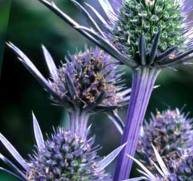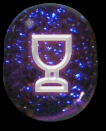Sea Holly
The Sea Holly (Eryngium maritimum), or Sea Hulver, is a well-known prickly sea-green plant, growing in the sand on many parts of our coasts, or on stony ground, with stiff leaves, and roots which run to a great length among the sand, whilst charged with a sweetish juice. A manufactory for making candied roots of the Sea Holly was established at Colchester, by Robert Burton, an apothecary, in the seventeenth century, as they were considered both antiscorbutic, and excellent for health.
Added Dec 1, 2010
| 7,104 Reads
Gerard says: "The roots, if eaten, are good for those that be liver sick; and they ease cramps, convulsions, and the falling sickness. If condited, or preserved with sugar, they are exceeding good to be given to old and aged people that are consumed and withered with age, and which want natural moisture." He goes on to give an elaborate receipt how to condite the roots of Sea Holly, or Eringos (which title is, according to Liddell and Scott, the diminutive of eerungos, "the beard of a goat." Or, Eryngo has been derived from the Greek eruggarein, to eructate, because the plant is, according to herbalists, a specific against belching). With healthy provers, who have taken the Sea Holly experimentally in toxical doses of varying strength the sexual energies and instincts became always depressed. This accounts for the fact that during the Elizabethan era, the roots of the plant used in moderation were highly valued for renovating masculine vigour, such as Falstaff invoked, and which classic writers have extolled:-- "Non male turn graiis florens eryngus in hortis Quaeritur; hunc gremio portet si nupta virentem Nunquam inconcessos conjux meditabitur ignes." --Rapinus. These Eryngo roots, prepared with sugar, were then called "Kissing Comfits." Lord Bacon when recommending the yolks of eggs for giving strength if taken with Malmsey, or sweet wine, says: "You shall doe well to put in some few slices of Eringium roots, and a little Ambergrice: for by this means, besides the immediate facultie of nourishment, such drinke will strengthen the back." Plutarch writes: "They report of the Sea Holly, if one goat taketh it into her mouth, it causeth her first to stand still, and afterwards the whole flock, until such time as the shepherd takes it from her." Boerhaave thought the root "a principal aperient."
Added Dec 1, 2010
| 7,104 Reads
Share The Magic ...
The GoE MONEY!!! Course - A Course In Real MONEY MAGIC!
|





















